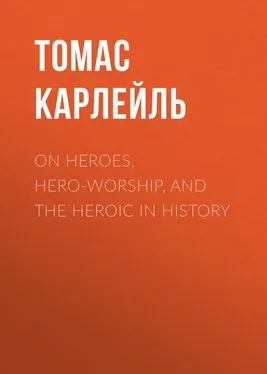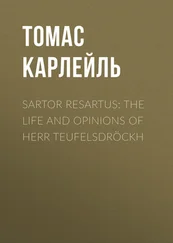Томас Карлейль - On Heroes, Hero-Worship, and the Heroic in History
Здесь есть возможность читать онлайн «Томас Карлейль - On Heroes, Hero-Worship, and the Heroic in History» — ознакомительный отрывок электронной книги совершенно бесплатно, а после прочтения отрывка купить полную версию. В некоторых случаях можно слушать аудио, скачать через торрент в формате fb2 и присутствует краткое содержание. Жанр: foreign_prose, История, foreign_edu, foreign_antique, на английском языке. Описание произведения, (предисловие) а так же отзывы посетителей доступны на портале библиотеки ЛибКат.
- Название:On Heroes, Hero-Worship, and the Heroic in History
- Автор:
- Жанр:
- Год:неизвестен
- ISBN:нет данных
- Рейтинг книги:5 / 5. Голосов: 1
-
Избранное:Добавить в избранное
- Отзывы:
-
Ваша оценка:
- 100
- 1
- 2
- 3
- 4
- 5
On Heroes, Hero-Worship, and the Heroic in History: краткое содержание, описание и аннотация
Предлагаем к чтению аннотацию, описание, краткое содержание или предисловие (зависит от того, что написал сам автор книги «On Heroes, Hero-Worship, and the Heroic in History»). Если вы не нашли необходимую информацию о книге — напишите в комментариях, мы постараемся отыскать её.
On Heroes, Hero-Worship, and the Heroic in History — читать онлайн ознакомительный отрывок
Ниже представлен текст книги, разбитый по страницам. Система сохранения места последней прочитанной страницы, позволяет с удобством читать онлайн бесплатно книгу «On Heroes, Hero-Worship, and the Heroic in History», без необходимости каждый раз заново искать на чём Вы остановились. Поставьте закладку, и сможете в любой момент перейти на страницу, на которой закончили чтение.
Интервал:
Закладка:
Thomas Carlyle
On Heroes, Hero-Worship, and the Heroic in History
LECTURE I. THE HERO AS DIVINITY. ODIN. PAGANISM: SCANDINAVIAN MYTHOLOGY
We have undertaken to discourse here for a little on Great Men, their manner of appearance in our world's business, how they have shaped themselves in the world's history, what ideas men formed of them, what work they did;—on Heroes, namely, and on their reception and performance; what I call Hero-worship and the Heroic in human affairs. Too evidently this is a large topic; deserving quite other treatment than we can expect to give it at present. A large topic; indeed, an illimitable one; wide as Universal History itself. For, as I take it, Universal History, the history of what man has accomplished in this world, is at bottom the History of the Great Men who have worked here. They were the leaders of men, these great ones; the modellers, patterns, and in a wide sense creators, of whatsoever the general mass of men contrived to do or to attain; all things that we see standing accomplished in the world are properly the outer material result, the practical realization and embodiment, of Thoughts that dwelt in the Great Men sent into the world: the soul of the whole world's history, it may justly be considered, were the history of these. Too clearly it is a topic we shall do no justice to in this place!
One comfort is, that Great Men, taken up in any way, are profitable company. We cannot look, however imperfectly, upon a great man, without gaining something by him. He is the living light-fountain, which it is good and pleasant to be near. The light which enlightens, which has enlightened the darkness of the world; and this not as a kindled lamp only, but rather as a natural luminary shining by the gift of Heaven; a flowing light-fountain, as I say, of native original insight, of manhood and heroic nobleness;—in whose radiance all souls feel that it is well with them. On any terms whatsoever, you will not grudge to wander in such neighborhood for a while. These Six classes of Heroes, chosen out of widely distant countries and epochs, and in mere external figure differing altogether, ought, if we look faithfully at them, to illustrate several things for us. Could we see them well, we should get some glimpses into the very marrow of the world's history. How happy, could I but, in any measure, in such times as these, make manifest to you the meanings of Heroism; the divine relation (for I may well call it such) which in all times unites a Great Man to other men; and thus, as it were, not exhaust my subject, but so much as break ground on it! At all events, I must make the attempt.
It is well said, in every sense, that a man's religion is the chief fact with regard to him. A man's, or a nation of men's. By religion I do not mean here the church-creed which he professes, the articles of faith which he will sign and, in words or otherwise, assert; not this wholly, in many cases not this at all. We see men of all kinds of professed creeds attain to almost all degrees of worth or worthlessness under each or any of them. This is not what I call religion, this profession and assertion; which is often only a profession and assertion from the outworks of the man, from the mere argumentative region of him, if even so deep as that. But the thing a man does practically believe (and this is often enough without asserting it even to himself, much less to others); the thing a man does practically lay to heart, and know for certain, concerning his vital relations to this mysterious Universe, and his duty and destiny there, that is in all cases the primary thing for him, and creatively determines all the rest. That is his religion ; or, it may be, his mere scepticism and no-religion : the manner it is in which he feels himself to be spiritually related to the Unseen World or No-World; and I say, if you tell me what that is, you tell me to a very great extent what the man is, what the kind of things he will do is. Of a man or of a nation we inquire, therefore, first of all, What religion they had? Was it Heathenism,—plurality of gods, mere sensuous representation of this Mystery of Life, and for chief recognized element therein Physical Force? Was it Christianism; faith in an Invisible, not as real only, but as the only reality; Time, through every meanest moment of it, resting on Eternity; Pagan empire of Force displaced by a nobler supremacy, that of Holiness? Was it Scepticism, uncertainty and inquiry whether there was an Unseen World, any Mystery of Life except a mad one;—doubt as to all this, or perhaps unbelief and flat denial? Answering of this question is giving us the soul of the history of the man or nation. The thoughts they had were the parents of the actions they did; their feelings were parents of their thoughts: it was the unseen and spiritual in them that determined the outward and actual;—their religion, as I say, was the great fact about them. In these Discourses, limited as we are, it will be good to direct our survey chiefly to that religious phasis of the matter. That once known well, all is known. We have chosen as the first Hero in our series Odin the central figure of Scandinavian Paganism; an emblem to us of a most extensive province of things. Let us look for a little at the Hero as Divinity, the oldest primary form of Heroism.
Surely it seems a very strange-looking thing this Paganism; almost inconceivable to us in these days. A bewildering, inextricable jungle of delusions, confusions, falsehoods, and absurdities, covering the whole field of Life! A thing that fills us with astonishment, almost, if it were possible, with incredulity,—for truly it is not easy to understand that sane men could ever calmly, with their eyes open, believe and live by such a set of doctrines. That men should have worshipped their poor fellow-man as a God, and not him only, but stocks and stones, and all manner of animate and inanimate objects; and fashioned for themselves such a distracted chaos of hallucinations by way of Theory of the Universe: all this looks like an incredible fable. Nevertheless it is a clear fact that they did it. Such hideous inextricable jungle of misworships, misbeliefs, men, made as we are, did actually hold by, and live at home in. This is strange. Yes, we may pause in sorrow and silence over the depths of darkness that are in man; if we rejoice in the heights of purer vision he has attained to. Such things were and are in man; in all men; in us too.
Some speculators have a short way of accounting for the Pagan religion: mere quackery, priestcraft, and dupery, say they; no sane man ever did believe it,—merely contrived to persuade other men, not worthy of the name of sane, to believe it! It will be often our duty to protest against this sort of hypothesis about men's doings and history; and I here, on the very threshold, protest against it in reference to Paganism, and to all other isms by which man has ever for a length of time striven to walk in this world. They have all had a truth in them, or men would not have taken them up. Quackery and dupery do abound; in religions, above all in the more advanced decaying stages of religions, they have fearfully abounded: but quackery was never the originating influence in such things; it was not the health and life of such things, but their disease, the sure precursor of their being about to die! Let us never forget this. It seems to me a most mournful hypothesis, that of quackery giving birth to any faith even in savage men. Quackery gives birth to nothing; gives death to all things. We shall not see into the true heart of anything, if we look merely at the quackeries of it; if we do not reject the quackeries altogether; as mere diseases, corruptions, with which our and all men's sole duty is to have done with them, to sweep them out of our thoughts as out of our practice. Man everywhere is the born enemy of lies. I find Grand Lamaism itself to have a kind of truth in it. Read the candid, clear-sighted, rather sceptical Mr. Turner's
Читать дальшеИнтервал:
Закладка:
Похожие книги на «On Heroes, Hero-Worship, and the Heroic in History»
Представляем Вашему вниманию похожие книги на «On Heroes, Hero-Worship, and the Heroic in History» списком для выбора. Мы отобрали схожую по названию и смыслу литературу в надежде предоставить читателям больше вариантов отыскать новые, интересные, ещё непрочитанные произведения.
Обсуждение, отзывы о книге «On Heroes, Hero-Worship, and the Heroic in History» и просто собственные мнения читателей. Оставьте ваши комментарии, напишите, что Вы думаете о произведении, его смысле или главных героях. Укажите что конкретно понравилось, а что нет, и почему Вы так считаете.












